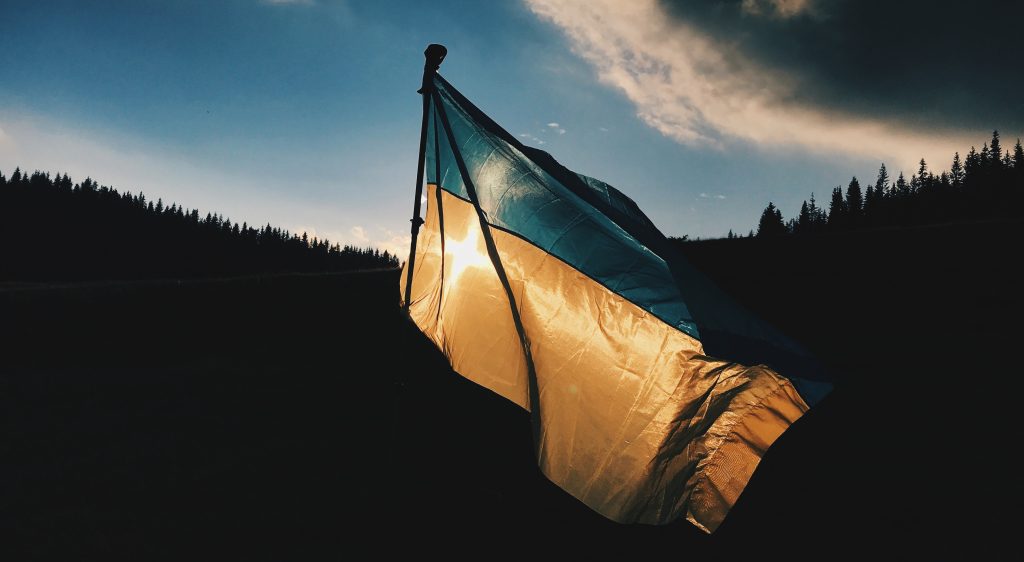Personal stories of family ties and working in Ukraine plus an analysis of what led to the Russian invasion galvanized the audience gathered at BC Law recently to better understand the current Eastern European crisis through the lenses of international justice and the region’s geopolitical history.
The event was organized quickly by Boston College’s Center for Human Rights and International Justice (CHRIJ) and BC Law’s International Law Society and drew a large audience to hear speakers Paul T. Christensen and Lindsey O’Rourke, both political science professors at BC, and Dustin A. Lewis, research director of Harvard Law’s Program on International Law and Armed Conflict. BC Law Professor Daniel Kanstroom, co-director of CHRIJ, moderated.
The discussion was immediately personal. Kanstroom spoke of his grandmother’s flight from Ukraine with her family as a young child over a century ago to build a new life in the United States. Christensen described his years abroad in Russia and Ukraine researching labor relations and worker strikes in the late Soviet era. His work mostly centered on miners in the now-embattled Donbas region of Ukraine, where separatist groups have recently joined forces with the Russian military. His heartache for Ukraine was palpable throughout the talk.
Kanstroom spoke of the years leading up to World War II and how Hitler’s rhetoric regarding ethnic Germans in the Sudetenland region of Czechoslovakia foreshadowed its annexation on the eve of that conflict. Now that the world is dealing with similar aggression by Russia against Ukraine, he emphasized the gravity of the situation by quoting from Justice Robert H. Jackson’s opening statement at the Nuremberg trials: “The wrongs which we seek to condemn and punish have been so calculated, so malignant, and so devastating, that civilization cannot tolerate their being ignored, because it cannot survive their being repeated.”
Though Kanstroom noted the striking generosity of European nations in accepting refugees displaced by the current crisis in Ukraine, he contrasted their treatment with that of refugees seeking asylum in Europe from other conflicts, especially from Syria. “Humanitarian law must be applied with equity and without discrimination,” he stressed.
O’Rourke, whose research centers on international relations theory, US foreign policy, international security, and military strategy, traced the roots of the current war in Ukraine to the collapse of the USSR in 1991 and the dueling spheres of influence that attempted to divide the newly independent Eastern European states in the years that followed. Things came to a head in 2008 when then-president George W. Bush expressed support for Georgia and Ukraine joining NATO, to the objections of the UK, France, and Germany, she explained. The compromise reached at the 2008 Bucharest Summit essentially left the door open to these democracies to join the military alliance in the future if they so choose.
The situation was further muddied when Viktor Yanukovych was elected President of Ukraine in 2010, O’Rourke continued. The pro-Russian Yanukovych rejected the European Union’s Ukrainian-European Association Agreement and was ousted after pro-EU protests in 2014. That year, Russia invaded Crimea and annexed parts of Ukraine in retaliation. Tensions have simmered between Russia, the EU, and NATO ever since, and Russia’s response to the budding relationship between Ukraine and the West was to build up forces along the border with Ukraine and, eventually, to invade.
Armed-conflict scholar Lewis laid out the legal framework bearing on Russia’s action in Ukraine, and how international humanitarian law and the laws of armed conflict apply to both sides of the invasion. Russia’s actions in Ukraine have constituted an “act of aggression” in clear violation of the United Nations’ charter and customary international law. He noted that although Russia has argued that this is an act of collective self-defense of ethnic Russians in Donetsk and Luhansk, the UN General Assembly roundly rejected that argument in adopting a resolution to condemn their behavior and demanding the withdrawal of military forces.
The extensive economic sanctions imposed upon Russia by the West are a powerful tool to hold Russia accountable, Lewis added, but he also lamented that many of the human rights crimes against civilians in Ukraine are likely to go unaddressed, in part due to Russia’s rejection of the International Criminal Court’s jurisdiction.
Christensen, drawing upon his own time in Ukraine and Russia, described the Russian motivations for the conflict and how the realities of the post-Soviet era led to the corrupt, oligarch-led government in charge of the country. Economic and state collapse in the 1990s led to overreliance on oil and natural gas and a rapid turn toward militarization to regain their previous strength. Putin has turned increasingly authoritarian over the years, Christensen said, but this has intensified significantly during the Ukraine conflict as the police jail protesters across Russia for extended prison terms.
Why now? Christensen believes that Putin and the other Russian oligarchs thought they were secure and powerful enough to force Ukraine’s acquiescence within days of the beginning of the invasion, and that the West’s response would be weak (as it was during the Crimean invasion). However, Christensen said, Putin was incorrect on both those counts: Ukraine has continued its unlikely resistance for nearly a month now, and the West’s economic sanctions have devastated the Russian economy.
When Kanstroom posed a final question, “How close are we to World War III?”, the room remained silent for some moments.
Finally, O’Rourke echoed prevalent news observations about President Biden’s commitment to avoid putting troops on the ground in Ukraine, and the worry that imposition of a no-fly zone would necessarily presage war between Russia and the NATO alliance.
Christensen closed the talk on a mournful note. “Sometimes I feel like we’re as close as we’ve been in a long time—11:59 p.m.,” a reference to the Doomsday Clock used by the “Bulletin of the Atomic Scientists” to forecast the likelihood of global catastrophe.


